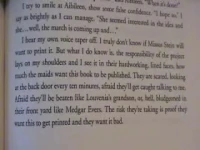After reading this novel, some things I realized were:
Segregation was really the fault of women, especially white women who got together to play bridge and have Junior League meetings. People who employed African American domestics would have been really nice if not for a few bad apples, like those who wanted power over toilets and knew that if they controlled the help around Jackson, Mississippi they’d have it. One such tyrant was Hilly Holbrook. Hilly wasn’t really a racist, she just felt it was her civic duty to keep the races separate (especially on toilets, though she didn’t mind eating Minny’s crap, since it was baked so nicely in a pie). And because all the ladies husbands were usually at work or off running the state or doing something else really, really important, women, like the help were left to their own devices.
If the males had been present to exercise some control over these gals we’d probably never have had segregation. Most southern gentlemen were at the mercy of their wives, and probably would have liked more black people if their wives hadn’t interfered. In The Help, many of the white males are just victims of circumstance, or basically picking the wrong mate. Skeeter’s dad actually said “I’ve got twenty-five Negroes working my fields and if anyone so much as laid a hand on them, or any of their families…” See how he lets it trail off? It’s like he’d do something really bad if someone messed with his black workers. Then he goes on to say he’s ashamed of Mississippi. Spoken like a true liberal. And Stuart’s dad (A politician no less!) seemed to agree with him. Not only that, the guys that caused trouble were the the ones inciting the African American’s to vote, like the Yankee who slept with Stuart’s ex-girlfriend, and most of the black males because they were described as “no-account” many times, and most had left their wives. All except Leroy. See, he was Minny’s husband and if he wasn’t making babies (they had five with a sixth on the way) he was usually drunk or abusing her.
Blacks had some really hilarious names (as opposed to nicknames) back then. Let’s see, there’s Pascagoula, Farina, Mule, Oney, Jameso, Treelore, Shy Winnie, Plaintain Fedelia, Shinelle (oh wait, I think that might be more of a modern name. I don’t believe the “elle’s” had started becoming popular until around the 1980s). Sure there was a group out called the “Shirelles” but Shinelle as in the shin bone or the tibia? Or Shinelle as opposed to the fabric Chenille? But that’s okay. Nobody’s fact checking on outlandish names. Or even fact checking period it seems.
Skeeter says Medgar Evers was bludgeoned on pg 277, and Minny says he was shot.
So does everybody else. But since Skeeter’s the hero of the book, I guess she doesn’t have to know stuff like that.
Oh wait, she wants to be a journalist. Or did she say she wanted to be a writer? No wait, I think she wanted to be an editor. Maybe it was all three at one time. So maybe she does need to know more than just playing bridge.
But contradictory stuff like that must not matter, just like how the story seems to have nothing but stereotypes for the black characters, only many of the major reviewers act like the characters perfectly represent black people.
Which is probably why most of the African Americans in The Help are described as large, tall, plump, fat, and…dark. That’s right, there’s so many descriptive words for a dark African American in here. There’s “black as asphalt” “black as night” “So black I couldn’t tell them apart” “ebony” why even brown is referenced as black. When Skeeter describes Constantine, she states “the shades of brown on Constantine were endless” and goes on to describe her arms as dark ebony and elbows as black. So black must be the new brown in The Help.
According to The Help, black people obviously couldn’t speak or understand English very well, Things would have probably been better for them if they’d learned. It was very hard for their employers to understand what they were saying, and that’s probably why many of them stayed as domestics. And both Aibileen and Minny actually made it clear that they didn’t want to be anything but a maid. I mean, Skeeter had to practically drag it out of Aibileen about wanting to be anything other than a maid, and Aibileen clearly said “no”.
And even under the oppression of segregation, they laughed and told jokes. In fact, there’s not really a black person in The Help who didn’t have something funny to say, especially since they couldn’t speak english as good as the white people in this book. Even lesser characters like Minny’s five year old daughter Kindra were funny at times. It’s like black people and humor go hand in hand.
I learned so much from this novel that I may have to use this as my new siggie:
Caution: Each African American is uniquely individual and may not to conform to known stereotypes.
THIS POST IS BEING HIGHLY SARCASTIC AND SHOULD BE TAKEN AS SUCH




Kimberly Klaus
May 5, 2015
At least in the movie, when Skeeter asks Aibileen if she ever dreamed of being something other than a maid, she nods yes. Did she ever expect to be something other than a maid, since her mother was a maid and her grandma a house slave? No. Dreamed of being something else? Yes.